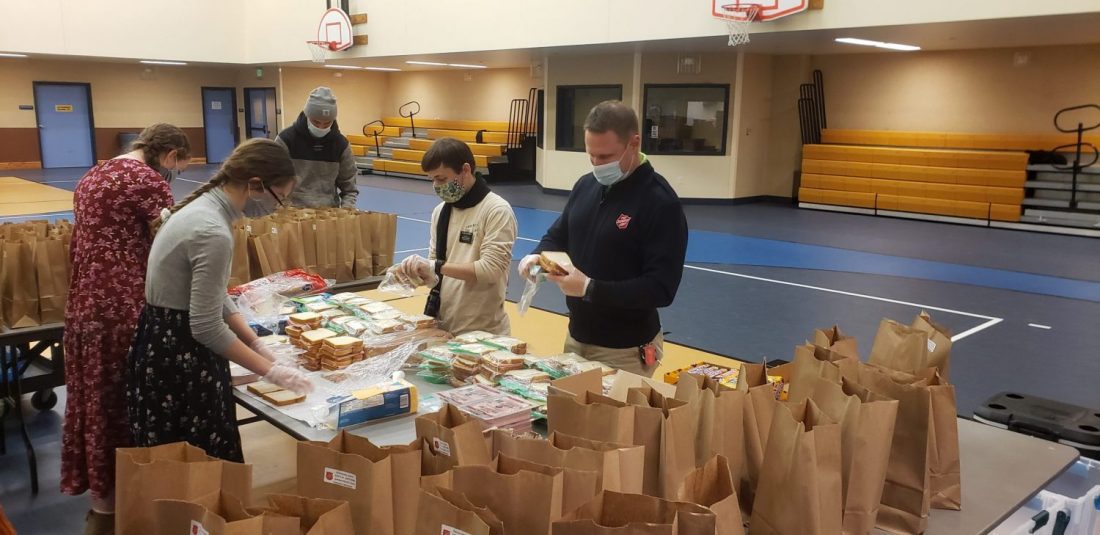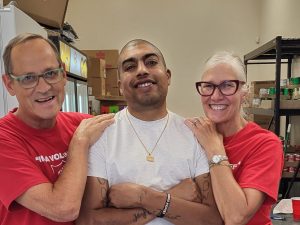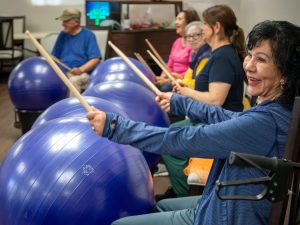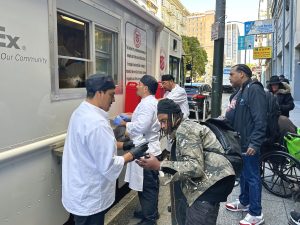The Salvation Army in the USA Western Territory is serious about reducing homelessness, launching The Way Out initiative in 2019, which aims to double the territory’s impact on homelessness by 2024. To this end, Army programs include shelters, case management, workforce development and rental assistance. Also important are the efforts of individual corps (local churches), which establish vital connections with people in need. In the territory’s 2020 mid-year The Way Out report, the Anchorage Corps received mention for its outreach programs—going strong before COVID-19 restrictions and continuing despite the challenging times.
Led by Majors Paul and Rachel Chouinard, the corps created a bridge for residents at Clitheroe Center, The Salvation Army’s residential treatment program, to the corps itself—potentially restoring hope for a better life. This summer it also began a weekly food distribution. The Way Out report noted that the Chouinards implemented Sunday school and Bible studies at Clitheroe House and at McKinnell House, The Salvation Army’s family shelter there. A group of people from the corps have gone out to the streets to feed the homeless and also fundraised to purchase bus tokens for the Army’s family services office, so individuals in need can return to their families.
Making connections
Captain Denice Delgado, Associate Social Services Director in Anchorage, spoke about the connections The Salvation Army makes with people in its social service programs.
“What’s important is us making contact with families—helping make the bridge when they get out of the program,” she said. “We can connect them with after-school programs, and with simple physical things and by reaching out to them. We’ll be able to keep that connection in years to come.”
Delgado praised the corps relationship with Clitheroe House residents and mentioned how members of Echelon Anchorage, The Salvation Army’s young adult advisory organization, have also formed bonds with residents there. Before the pandemic, the group held monthly birthday celebrations at Clitheroe House; currently, they have adopted the women residents and are preparing Christmas gifts for them, understanding the holidays can be a difficult time for people in treatment.
“Everything is heightened by COVID-19 and the holidays,” Delgado said.
The Salvation Army has also been able to make connections through its Department of Corrections (DOC) program, which allows the Army to work with incarcerated individuals, including women at Alaska’s women’s correctional facility, Highland Mountain. Last year, the correctional superintendent provided tickets to The Salvation Army’s annual Teddy Bear Tea for the women being released. Through a connection made at the tea, one of the women was able to obtain work at the Matsu-Valley thrift store.
Delgado spoke about how The Salvation Army maintains contact with incarcerated individuals once they are released. Although the Army cannot directly track them, they do give them vouchers to the Army’s family stores. When they come to the store, the Army is able to reconnect with them.
“We are able to connect them back to the church,” Delgado said. For those people from out of the area, The Salvation Army refers them to their home corps.
“[This is] challenging because of COVID-19,” she said. “How can we still bridge people to our programs? That’s the current challenge.”
Operation CHRIST
One program that has taken off during the pandemic is the Anchorage Corps’ Operation CHRIST—“Citywide Homeless Relief Impact Service Team”—which provides practical assistance, especially food, to individuals and families in need. The outreach began this summer, when the corps received a $55,000 grant from the larger T.L. Williams Trust Grant, which supports programs that help alleviate problems experienced by Americans struggling financially. The grant allows The Salvation Army to supply to-go meals to people who fall at or below the poverty level in Anchorage. Distribution takes place every Friday afternoon outside the corps center on The Salvation Army’s SAFE Campus in Anchorage, from the mobile canteen.
“The canteen serves as a backdrop; it’s colorful and has eye appeal and is visible from the road” Paul Chouinard said. “It’s cold now,” he added. The high temperature is 15 degrees and there’s snow, so we’ve started serving hot coffee and cocoa…We literally have people living in tents in the woods across from the corps.”
He spoke of the importance not only of providing food and a warm drink to those in need, but also of the human connection, especially during the pandemic.
“This is really important—the social contact,” he said. They can tell us their story. We can encourage them and lift their spirit. It gives them a chance for fellowship, to interact with others. People are cut off from each other because of COVID restrictions. We tell them about what we do, about the after-school program. It gives them a chance to meet us and have a friendly conversation.”
Volunteers, including those from Latter Day Saints Charities (LDS), arrive Friday morning to prepare the bagged meals, which include a sandwich, several snacks, a dessert and water. The meals are free to anyone who needs one, no questions asked, thanks to the funding from the T.L. Williams grant.
“We are blessed to have the funding to provide a weekly meal to our neighbors in the most need.” Rachel Chouinard said. “Although many of us have never experienced choosing between eating or paying a bill, it’s a very real issue for many families and individuals in the Anchorage area. We pray that our program will give some hope to those we are helping.”
Anchorage Social Services Director Lt. Amelia Jones said the program is keeping volunteers busy. “We started off making 75 sandwiches,” she told KTUU. “Then we upped it to 100, and I believe today [Oct. 30] we prepared for 200, so we’ve had a gradual increase as the word gets out.”
Jones said they are also looking for donations to be able to distribute warm clothing along with the food.
“With word of mouth over the past few months, there have been more individuals from nearby homeless camps taking advantage of the program,” Rachel Chouinard said. “We have also received people who have picked up meals for other family members, and are happy to provide them additional meals. [Recently] the meal to go consisted of two ham and cheese sandwiches, a bag of chips, some fruit, a granola bar and a candy bar as a Halloween treat.
Future plans include becoming mobile, Paul Chouinard said, noting “the funding is strong.” City regulations permitting, they are considering taking the canteen to apartment complexes and parks, and perhaps serving hot soup or chili.
Despite the pandemic, The Salvation Army in Anchorage continues to reach out to people by meeting practical needs, offering hope for a better future, and building connections that will stand the test of time—and outlast COVID-19.
Do Good:
- Find out more about how The Salvation Army is helping the homeless during the COVID-19 pandemic.
- See how you can get involved in the Fight for Good with The Salvation Army.













